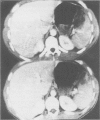Abstract
During the past decade splenic salvage procedures rather than splenectomy have been considered the preferred treatment for traumatic splenic injuries. Splenic preservation has been most often accomplished by splenorrhaphy and more recently by a controversial nonoperative approach. This report delineates indications, contraindications, and results with splenectomy, splenorrhaphy, and nonoperative treatment based on an 11-year experience (1978 to 1989) in which 193 consecutive adult patients with splenic injuries were treated. One hundred sixty-seven patients (86.5%) underwent urgent operation. Of these, 111 (66%) were treated by splenorrhaphy or partial splenectomy and 56 (34%) were treated by splenectomy. During the last 4 years, 26 additional patients (13.5%) were managed without operation. Patients considered for nonoperative treatment were alert, hemodynamically stable with computed tomographic evidence of isolated grades I to III splenic injuries. Overall 24% of the injuries resulted from penetrating trauma, whereas 76% of the patients sustained blunt injuries. Complications were rare, with two patients in the splenorrhaphy group experiencing re-bleeding (1.8%) and one patient (4%) failing nonoperative treatment. The mortality rate for the entire group was 4%. This report documents that splenorrhaphy can safely be performed in 65% to 75% of splenic injuries. Splenectomy is indicated for more extensive injuries or when patients are hemodynamically unstable in the presence of life-threatening injuries. Nonoperative therapy can be accomplished safely in a small select group (15% to 20%), with a success rate of nearly 90% if strict criteria for selection are met.
Full text
PDF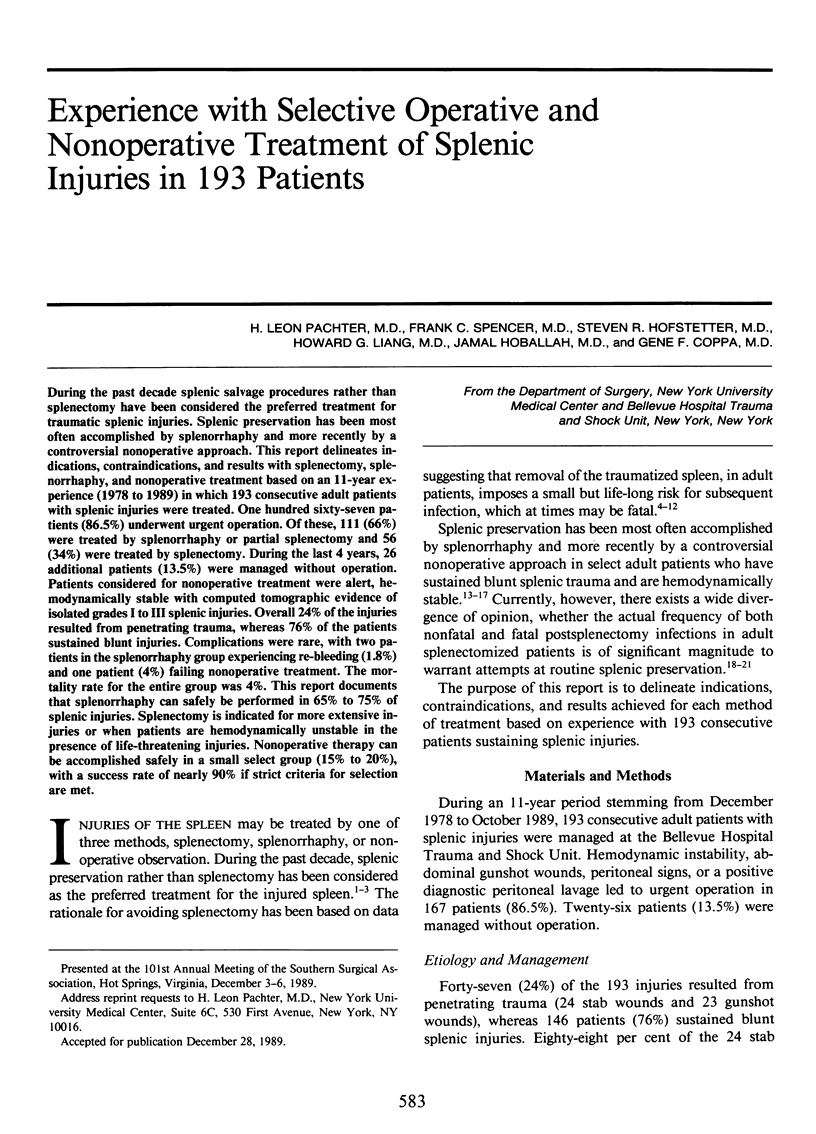
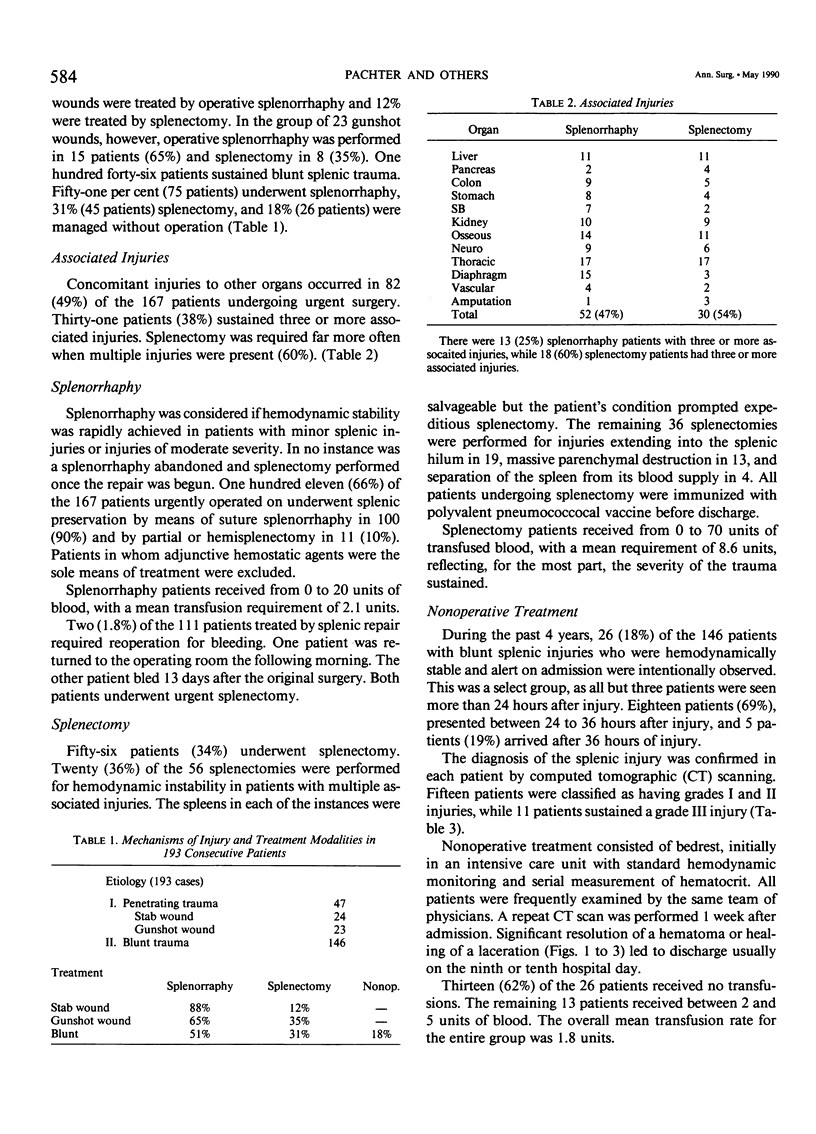
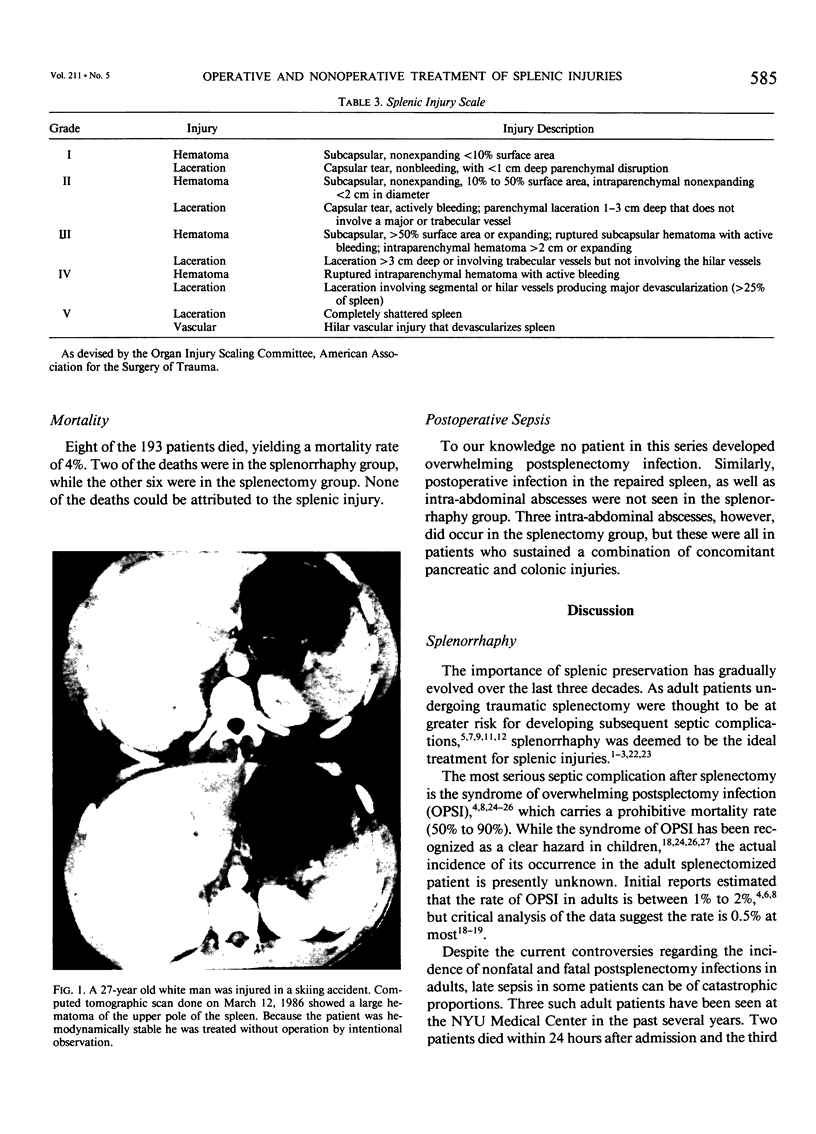
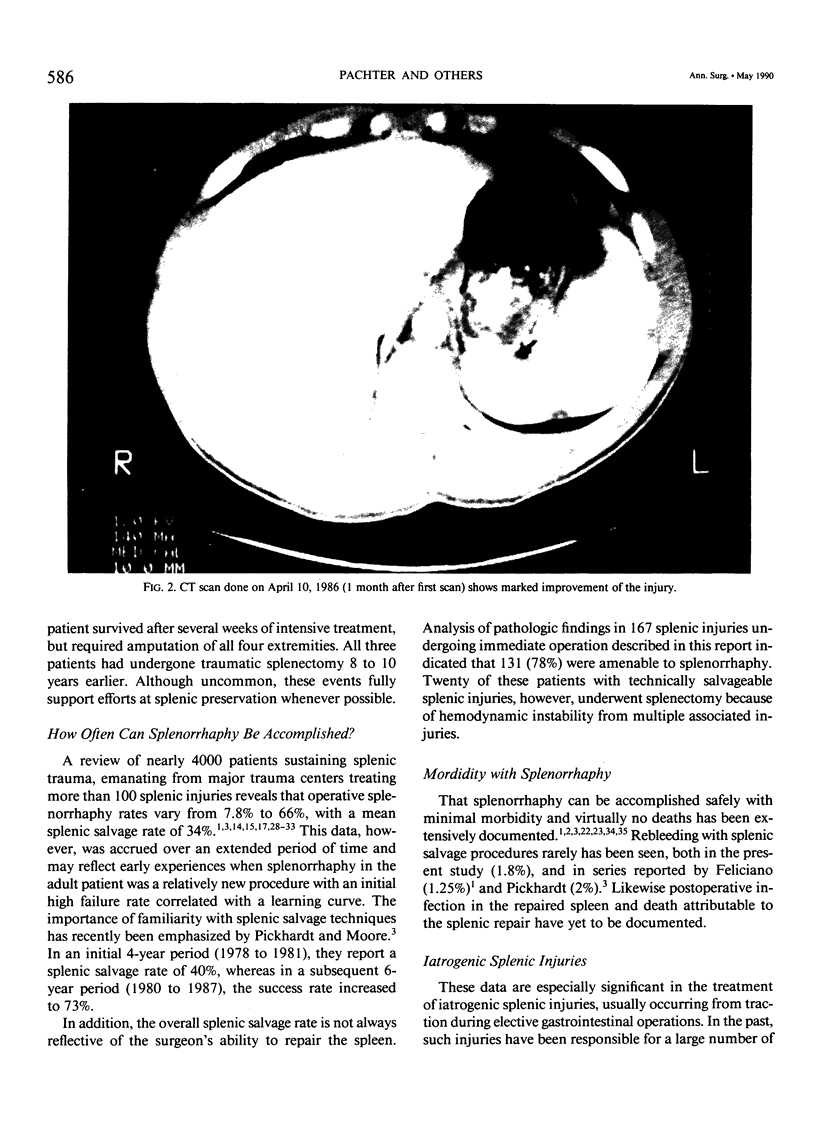
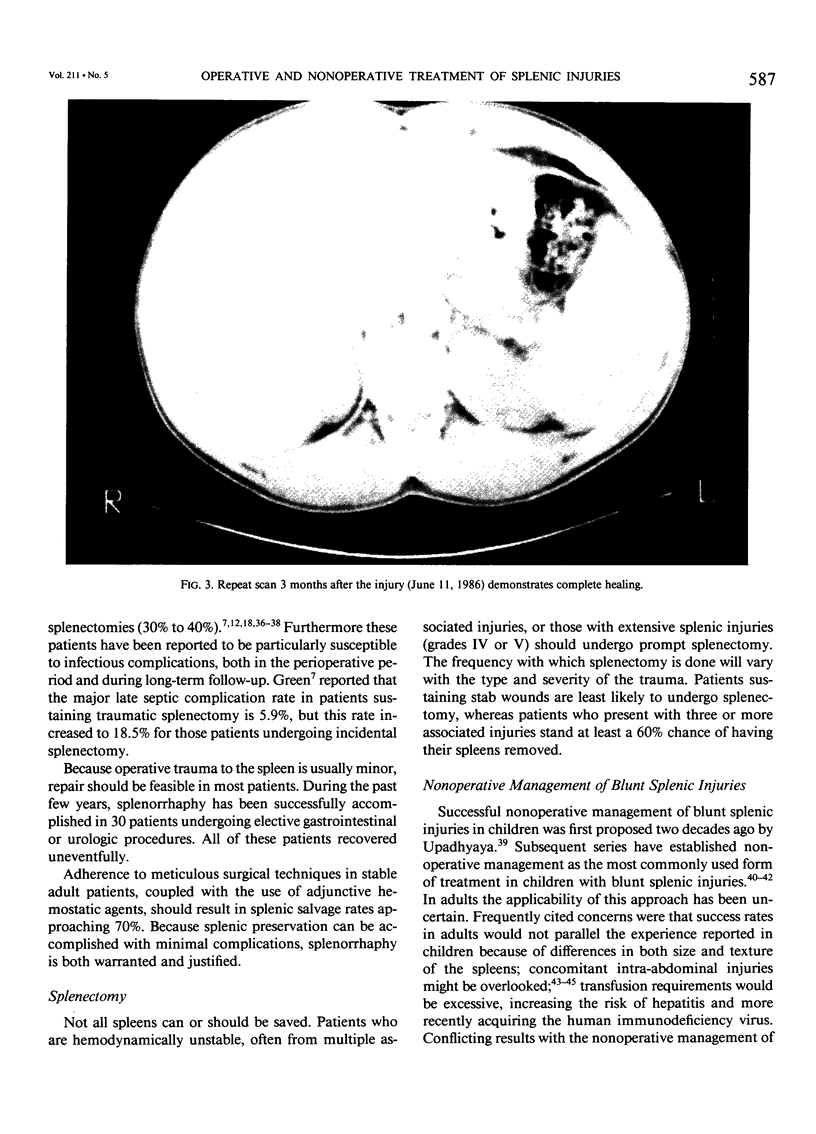
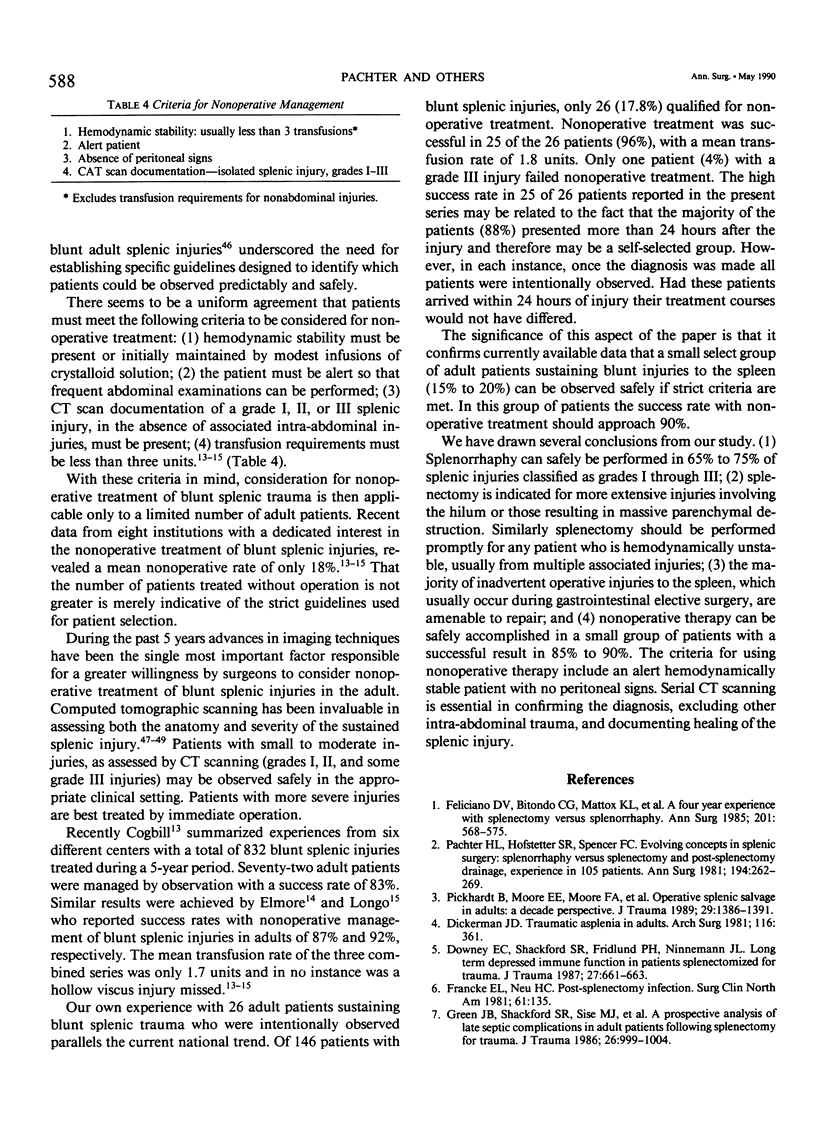
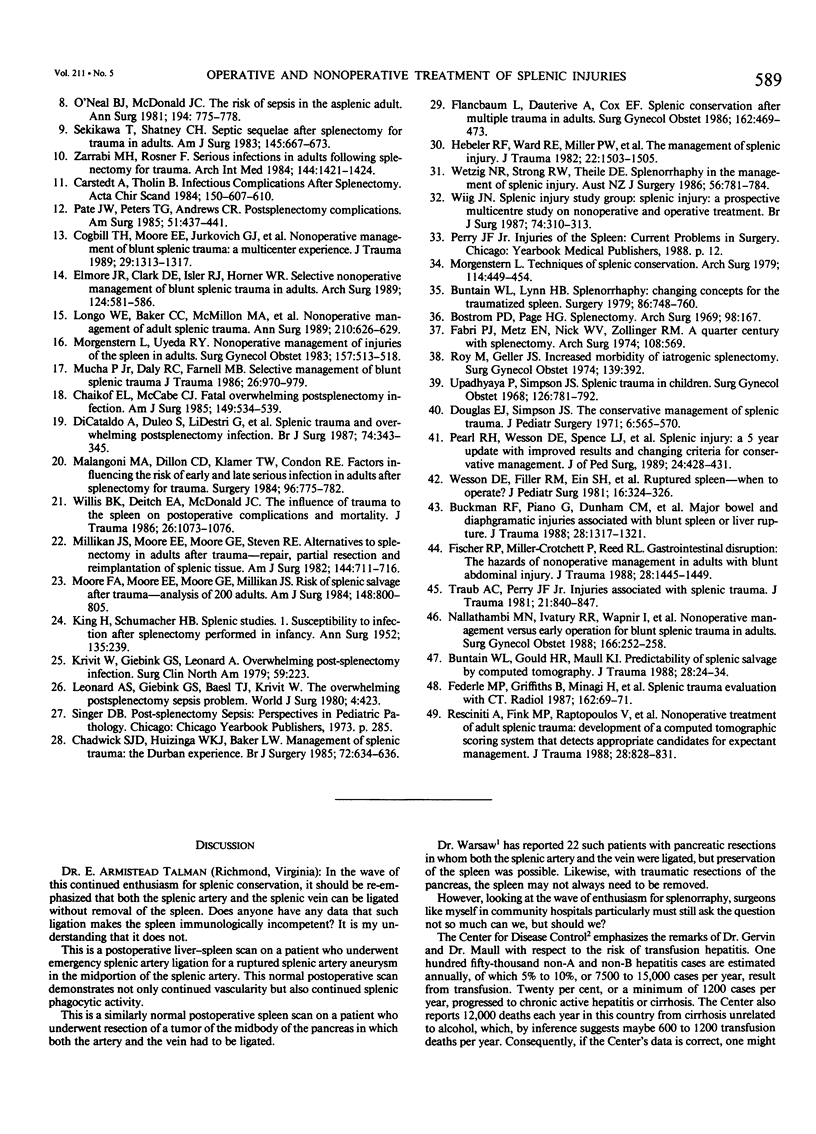
Images in this article
Selected References
These references are in PubMed. This may not be the complete list of references from this article.
- Bostrom P. D., Page H. G. Splenectomy. An 11-year review. Arch Surg. 1969 Feb;98(2):167–170. doi: 10.1001/archsurg.1969.01340080059010. [DOI] [PubMed] [Google Scholar]
- Buckman R. F., Jr, Piano G., Dunham C. M., Soutter I., Ramzy A., Militello P. R. Major bowel and diaphragmatic injuries associated with blunt spleen or liver rupture. J Trauma. 1988 Sep;28(9):1317–1321. doi: 10.1097/00005373-198809000-00004. [DOI] [PubMed] [Google Scholar]
- Buntain W. L., Gould H. R., Maull K. I. Predictability of splenic salvage by computed tomography. J Trauma. 1988 Jan;28(1):24–34. doi: 10.1097/00005373-198801000-00004. [DOI] [PubMed] [Google Scholar]
- Buntain W. L., Lynn H. B. Splenorrhaphy: changing concepts for the traumatized spleen. Surgery. 1979 Nov;86(5):748–760. [PubMed] [Google Scholar]
- Carlstedt A., Tholin B. Infectious complications after splenectomy. Acta Chir Scand. 1984;150(8):607–610. [PubMed] [Google Scholar]
- Chadwick S. J., Huizinga W. K., Baker L. W. Management of splenic trauma: the Durban experience. Br J Surg. 1985 Aug;72(8):634–636. doi: 10.1002/bjs.1800720817. [DOI] [PubMed] [Google Scholar]
- Chaikof E. L., McCabe C. J. Fatal overwhelming postsplenectomy infection. Am J Surg. 1985 Apr;149(4):534–539. doi: 10.1016/s0002-9610(85)80052-0. [DOI] [PubMed] [Google Scholar]
- Cogbill T. H., Moore E. E., Jurkovich G. J., Morris J. A., Mucha P., Jr, Shackford S. R., Stolee R. T., Moore F. A., Pilcher S., LoCicero R. Nonoperative management of blunt splenic trauma: a multicenter experience. J Trauma. 1989 Oct;29(10):1312–1317. doi: 10.1097/00005373-198910000-00002. [DOI] [PubMed] [Google Scholar]
- Di Cataldo A., Puleo S., Li Destri G., Racalbuto A., Trombatore G., Latteri F., Rodolico G. Splenic trauma and overwhelming postsplenectomy infection. Br J Surg. 1987 May;74(5):343–345. doi: 10.1002/bjs.1800740504. [DOI] [PubMed] [Google Scholar]
- Dickerman J. D. Traumatic asplenia in adults: a defined hazard? Arch Surg. 1981 Mar;116(3):361–363. doi: 10.1001/archsurg.1981.01380150079022. [DOI] [PubMed] [Google Scholar]
- Douglas G. J., Simpson J. S. The conservative management of splenic trauma. J Pediatr Surg. 1971 Oct;6(5):565–570. doi: 10.1016/0022-3468(71)90380-0. [DOI] [PubMed] [Google Scholar]
- Downey E. C., Shackford S. R., Fridlund P. H., Ninnemann J. L. Long-term depressed immune function in patients splenectomized for trauma. J Trauma. 1987 Jun;27(6):661–663. doi: 10.1097/00005373-198706000-00010. [DOI] [PubMed] [Google Scholar]
- Elmore J. R., Clark D. E., Isler R. J., Horner W. R. Selective nonoperative management of blunt splenic trauma in adults. Arch Surg. 1989 May;124(5):581–586. doi: 10.1001/archsurg.1989.01410050071015. [DOI] [PubMed] [Google Scholar]
- Fabri P. J., Metz E. N., Nick W. V., Zollinger R. M. Proceedings: A quarter century with splenectomy. Changing concepts. Arch Surg. 1974 Apr;108(4):569–575. doi: 10.1001/archsurg.1974.01350280169028. [DOI] [PubMed] [Google Scholar]
- Federle M. P., Griffiths B., Minagi H., Jeffrey R. B., Jr Splenic trauma: evaluation with CT. Radiology. 1987 Jan;162(1 Pt 1):69–71. doi: 10.1148/radiology.162.1.3786787. [DOI] [PubMed] [Google Scholar]
- Feliciano D. V., Bitondo C. G., Mattox K. L., Rumisek J. D., Burch J. M., Jordan G. L., Jr A four-year experience with splenectomy versus splenorrhaphy. Ann Surg. 1985 May;201(5):568–575. doi: 10.1097/00000658-198505000-00005. [DOI] [PMC free article] [PubMed] [Google Scholar]
- Fischer R. P., Miller-Crotchett P., Reed R. L., 2nd Gastrointestinal disruption: the hazard of nonoperative management in adults with blunt abdominal injury. J Trauma. 1988 Oct;28(10):1445–1449. [PubMed] [Google Scholar]
- Flancbaum L., Dauterive A., Cox E. F. Splenic conservation after multiple trauma in adults. Surg Gynecol Obstet. 1986 May;162(5):469–473. [PubMed] [Google Scholar]
- Francke E. L., Neu H. C. Postsplenectomy infection. Surg Clin North Am. 1981 Feb;61(1):135–155. doi: 10.1016/s0039-6109(16)42339-x. [DOI] [PubMed] [Google Scholar]
- Green J. B., Shackford S. R., Sise M. J., Fridlund P. Late septic complications in adults following splenectomy for trauma: a prospective analysis in 144 patients. J Trauma. 1986 Nov;26(11):999–1004. doi: 10.1097/00005373-198611000-00007. [DOI] [PubMed] [Google Scholar]
- KING H., SHUMACKER H. B., Jr Splenic studies. I. Susceptibility to infection after splenectomy performed in infancy. Ann Surg. 1952 Aug;136(2):239–242. doi: 10.1097/00000658-195208000-00006. [DOI] [PMC free article] [PubMed] [Google Scholar]
- Krivit W., Giebink G. S., Leonard A. Overwhelming postplenectomy infection. Surg Clin North Am. 1979 Apr;59(2):223–233. doi: 10.1016/s0039-6109(16)41782-2. [DOI] [PubMed] [Google Scholar]
- Leonard A. S., Giebink G. S., Baesl T. J., Krivit W. The overwhelming postsplenectomy sepsis problem. World J Surg. 1980 Jul;4(4):423–432. doi: 10.1007/BF02393164. [DOI] [PubMed] [Google Scholar]
- Longo W. E., Baker C. C., McMillen M. A., Modlin I. M., Degutis L. C., Zucker K. A. Nonoperative management of adult blunt splenic trauma. Criteria for successful outcome. Ann Surg. 1989 Nov;210(5):626–629. doi: 10.1097/00000658-198911000-00010. [DOI] [PMC free article] [PubMed] [Google Scholar]
- Malangoni M. A., Dillon L. D., Klamer T. W., Condon R. E. Factors influencing the risk of early and late serious infection in adults after splenectomy for trauma. Surgery. 1984 Oct;96(4):775–783. [PubMed] [Google Scholar]
- Millikan J. S., Moore E. E., Moore G. E., Stevens R. E. Alternatives to splenectomy in adults after trauma. Repair, partial resection, and reimplantation of splenic tissue. Am J Surg. 1982 Dec;144(6):711–716. doi: 10.1016/0002-9610(82)90556-6. [DOI] [PubMed] [Google Scholar]
- Moore F. A., Moore E. E., Moore G. E., Millikan J. S. Risk of splenic salvage after trauma. Analysis of 200 adults. Am J Surg. 1984 Dec;148(6):800–805. doi: 10.1016/0002-9610(84)90441-0. [DOI] [PubMed] [Google Scholar]
- Morgenstern L., Shapiro S. J. Techniques of splenic conservation. Arch Surg. 1979 Apr;114(4):449–454. doi: 10.1001/archsurg.1979.01370280103015. [DOI] [PubMed] [Google Scholar]
- Morgenstern L., Uyeda R. Y. Nonoperative management of injuries of the spleen in adults. Surg Gynecol Obstet. 1983 Dec;157(6):513–518. [PubMed] [Google Scholar]
- Mucha P., Jr, Daly R. C., Farnell M. B. Selective management of blunt splenic trauma. J Trauma. 1986 Nov;26(11):970–979. doi: 10.1097/00005373-198611000-00003. [DOI] [PubMed] [Google Scholar]
- Nallathambi M. N., Ivatury R. R., Wapnir I., Rohman M., Stahl W. M. Nonoperative management versus early operation for blunt splenic trauma in adults. Surg Gynecol Obstet. 1988 Mar;166(3):252–258. [PubMed] [Google Scholar]
- O'Neal B. J., McDonald J. C. The risk of sepsis in the asplenic adult. Ann Surg. 1981 Dec;194(6):775–778. doi: 10.1097/00000658-198112000-00020. [DOI] [PMC free article] [PubMed] [Google Scholar]
- Pachter H. L., Hofstetter S. R., Spencer F. C. Evolving concepts in splenic surgery: splenorrhaphy versus splenectomy and postsplenectomy drainage: experience in 105 patients. Ann Surg. 1981 Sep;194(3):262–269. doi: 10.1097/00000658-198109000-00003. [DOI] [PMC free article] [PubMed] [Google Scholar]
- Pate J. W., Peters T. G., Andrews C. R. Postsplenectomy complications. Am Surg. 1985 Aug;51(8):437–441. [PubMed] [Google Scholar]
- Pearl R. H., Wesson D. E., Spence L. J., Filler R. M., Ein S. H., Shandling B., Superina R. A. Splenic injury: a 5-year update with improved results and changing criteria for conservative management. J Pediatr Surg. 1989 May;24(5):428–431. doi: 10.1016/s0022-3468(89)80394-x. [DOI] [PubMed] [Google Scholar]
- Pickhardt B., Moore E. E., Moore F. A., McCroskey B. L., Moore G. E. Operative splenic salvage in adults: a decade perspective. J Trauma. 1989 Oct;29(10):1386–1391. doi: 10.1097/00005373-198910000-00017. [DOI] [PubMed] [Google Scholar]
- Resciniti A., Fink M. P., Raptopoulos V., Davidoff A., Silva W. E. Nonoperative treatment of adult splenic trauma: development of a computed tomographic scoring system that detects appropriate candidates for expectant management. J Trauma. 1988 Jun;28(6):828–831. [PubMed] [Google Scholar]
- Roy M., Geller J. S. Increased morbidity of iatrogenic splenectomy. Surg Gynecol Obstet. 1974 Sep;139(3):392–394. [PubMed] [Google Scholar]
- Sekikawa T., Shatney C. H. Septic sequelae after splenectomy for trauma in adults. Am J Surg. 1983 May;145(5):667–673. doi: 10.1016/0002-9610(83)90118-6. [DOI] [PubMed] [Google Scholar]
- Singer D. B. Postsplenectomy sepsis. Perspect Pediatr Pathol. 1973;1:285–311. [PubMed] [Google Scholar]
- Splenic injury: a prospective multicentre study on non-operative and operative treatment. The Splenic Injury Study Group. Br J Surg. 1987 Apr;74(4):310–313. doi: 10.1002/bjs.1800740428. [DOI] [PubMed] [Google Scholar]
- Traub A. C., Perry J. F., Jr Injuries associated with splenic trauma. J Trauma. 1981 Oct;21(10):840–847. doi: 10.1097/00005373-198110000-00003. [DOI] [PubMed] [Google Scholar]
- Upadhyaya P., Simpson J. S. Splenic trauma in children. Surg Gynecol Obstet. 1968 Apr;126(4):781–790. [PubMed] [Google Scholar]
- Wesson D. E., Filler R. M., Ein S. H., Shandling B., Simpson J. S., Stephens C. A. Ruptured spleen--when to operate? J Pediatr Surg. 1981 Jun;16(3):324–326. doi: 10.1016/s0022-3468(81)80689-6. [DOI] [PubMed] [Google Scholar]
- Wetzig N. R., Strong R. W., Theile D. E. Splenorrhaphy in the management of splenic injury. Aust N Z J Surg. 1986 Oct;56(10):781–784. doi: 10.1111/j.1445-2197.1986.tb02326.x. [DOI] [PubMed] [Google Scholar]
- Willis B. K., Deitch E. A., McDonald J. C. The influence of trauma to the spleen on postoperative complications and mortality. J Trauma. 1986 Dec;26(12):1073–1076. doi: 10.1097/00005373-198612000-00002. [DOI] [PubMed] [Google Scholar]
- Zarrabi M. H., Rosner F. Serious infections in adults following splenectomy for trauma. Arch Intern Med. 1984 Jul;144(7):1421–1424. [PubMed] [Google Scholar]



